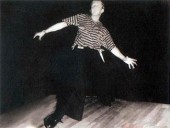History
Northern soul music originally consisted of obscure American soul recordings, including songs from Motown Records, Stax Records and more obscure record labels such as Okeh Records. The phrase northern soul was coined by journalist Dave Godin and popularised in 1970 through his column in Blues and Soul magazine. In a 2002 interview with Chris Hunt of Mojo, he explained that he had first come up with the term in 1968 as a sales reference for use in his record shop in Covent Garden, to help staff differentiate the more modern funkier sounds from the smoother, Motown-influenced soul of a few years earlier:I had started to notice that northern football fans who were in London to follow their team were coming into the store to buy records, but they weren’t interested in the latest developments in the black American chart. I devised the name as a shorthand sales term. It was just to say ‘if you’ve got customers from the north, don’t waste time playing them records currently in the US black chart, just play them what they like - ‘Northern Soul’. [1]
A large proportion of northern soul's original audience came from the mod movement. Some mods started to embrace the freakbeat and psychedelic rock of the late 1960s, but other mods - especially those in northern England - stuck to the original mod soundtrack of soul and blue beat. Some mods transformed into what would eventually be the skinheads, and others formed the basis of the northern soul scene. Early northern soul fashion included bowling shirts, button-down Ben Sherman shirts, blazers with centre vents and unusual numbers of buttons, Trickers brogue shoes, baggy trousers or shrink-to-fit Levi's jeans. Many dancers wore badges representing membership to clubs organised by dance halls.
The first nightclub that effectively defined the northern soul sound was Manchester's Twisted Wheel Club. Other early clubs were the The Mojo in Sheffield, The Catacombs in Wolverhampton, Golden Torch in Stoke, Room at the Top in Wigan, the Wigan Casino, the Blackpool Mecca and Va Va's in Bolton. The music reached its peak of popularity in the mid to late 1970s, when Wigan Casino was voted the world's number one discotheque. Thousands of people visited every week, but the exclusive and underground appeal of the music was lost and many of the hardcore soul fans drifted away. When Wigan Casino shut down In 1981, many believed the northern soul scene was about to end. However, the 1970s mod revival and the later scooterboy subculture produced a new wave of fans.
The 1980s — often dismissed as a low period for the northern soul scene by those who had left in the 1970s — featured almost 100 new venues in places as diverse as Bradford, London, Peterborough, Leighton Buzzard, Whitchurch, Coventry and Leicester. Pre-eminent among the 1980s venues were Stafford's Top of the World and London's 100 Club. Previously, most of the records played at northern soul clubs had been fast stompers, but 1980s northern soul DJs started to also play mid-tempo tunes, slower ballads.
Artists and records
Northern soul is among the most expensive of musical genres to collect. Hundreds of 7" vinyl discs have broken the £1,000 (c.$2,000) barrier. Frank Wilson's "Do I Love You" sold several years ago for £15,000 (c.$30,000). The value of many discs has appreciated due to rarity, quality of the beat, melody and lyrics (often expressing heartache, pain or joy related to romantic love).
Many soul artists attempted stardom without all of the necessary ingredients in place. Low-budget independent labels couldn't deliver the necessary promotion and radio play. Many artists had to go back to their day jobs, thinking themselves failures, with their records sinking into obscurity, until they were revived in the Northern Soul circuit. Songs by Tami Lynn, The Fascinations and The Velvelettes, that were originally released in the 1960s, all became top 40 UK hits in 1971. Tami Lynn got to 6 with "I'm Gonna Run Away From You", The Fascinations made 30 with "Girls Are Out to Get you" and the Velvelettes managed 35 with "These Things Will Keep Me Loving You."
Several acts have travelled to England to perform their classics at all-nighters, often many years after the original releases. Now, in the 21st century, rare 1960s soul sounds are still being discovered by fans, and Northern Soul is still going strong around the world.
